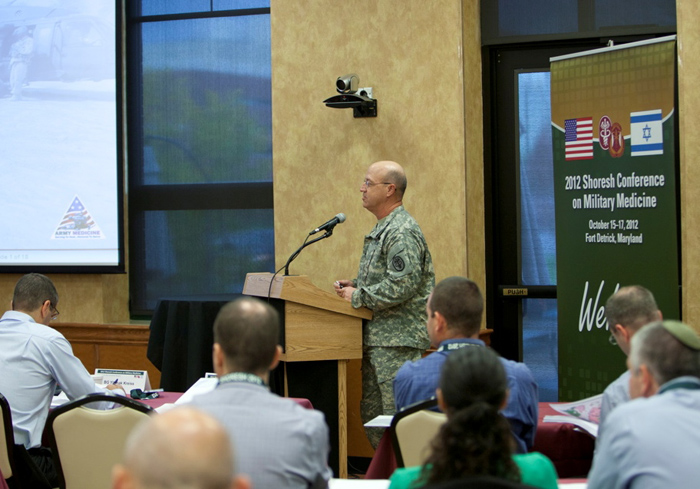U.S. and Israeli medical researchers collaborate at Shoresh 2012

Representatives from U.S. and Israeli military medicine gathered at Fort Detrick, Md., to share information on current and future medical research at the 2012 Shoresh conference Oct. 15-17. Close to 200 attendees participated in the biannual seminar, which has been held for nearly three decades.
Lt. Gen. Patricia D. Horoho, surgeon general of the U.S. Army and commanding general of the U.S. Army Medical Command, welcomed participants to the meeting via teleconference.
"I encourage you to make keeping the military family healthy as well as safe an important goal of your work," said Horoho. "International partnerships such as this between the U.S. and Israel for military health research can build on this approach to improve health in both developed and underdeveloped countries around the world. Healthy countries are stable countries."
The Shoresh conference brings together top scientists and researchers from both countries in order to find solutions to issues involving the pillars of military medicine, which include chemical and biological defense, trauma and combat casualty care, psychological stress, and infectious diseases.
Maj. Gen. James K. Gilman, commanding general of the U.S. Army Medical Research and Materiel Command and Fort Detrick, provided an overview of the USAMRMC and its various subcommands and laboratories. Among these are the U.S. Army Medical Research Institute of Infectious Diseases and the Walter Reed Army Institute of Research.
"We are involved in the full life-cycle of the solutions to our medical materiel problems," said Gilman. "The biodefense portfolio, and the biodefense program, has always been a very important part of Shoresh."
After his synopsis, Gilman introduced the leader of the Israeli delegation to the conference, Brig. Gen. Yitshak Kreiss, surgeon general of the Israeli Defense Forces, who offered kind words for the host country.
Kreiss said, "Shoresh in Hebrew means 'roots.' The roots of the Shoresh meeting were planted decades ago, and this lovely meeting hosted by our American friends today is the fruit of long-standing tradition of the mutual collaboration between our respective organizations."
"We believe in Shoresh. We believe that our most important colleague, the U.S. Armed Forces, shares the same values, the same goals, and the way to get there. Above that, we feel that medicine is a true bridge to work on that."
The three-day meeting offered more than 40 presentations, with topics ranging from "microbe hunting" to "physical training injuries." The attendees appeared very engaged throughout the sessions, and the positive attitude visible throughout the room suggested that the conference was a success.
While pleased with the level of information exchanged throughout the meeting, this year's conference held a special place for Gilman.
"The Shoresh conference was viewed by Brig. Gen. Kreiss as further affirmation of our strong strategic partnership," said Gilman. "This outcome from Shoresh 2012 was well above our most ambitious expectations."
While Kreiss remarked that the Israeli delegation was made to feel "at home" on the grounds of Fort Detrick, his country will again play host when both parties gather for Shoresh in 2014. This method of alternating locations has been the tradition since the forum's inception, which initially took place in the town of Shoresh, Israel, in the 1980s.
"Our ties ... run much deeper than a military partnership," said Horoho. "We can move beyond our military and political relationships and extend our health research partnerships to begin to change health. Our future for cooperative military medical research is bright. This continued sharing of our technology and healthcare research will keep both of our nations ready and resilient."














